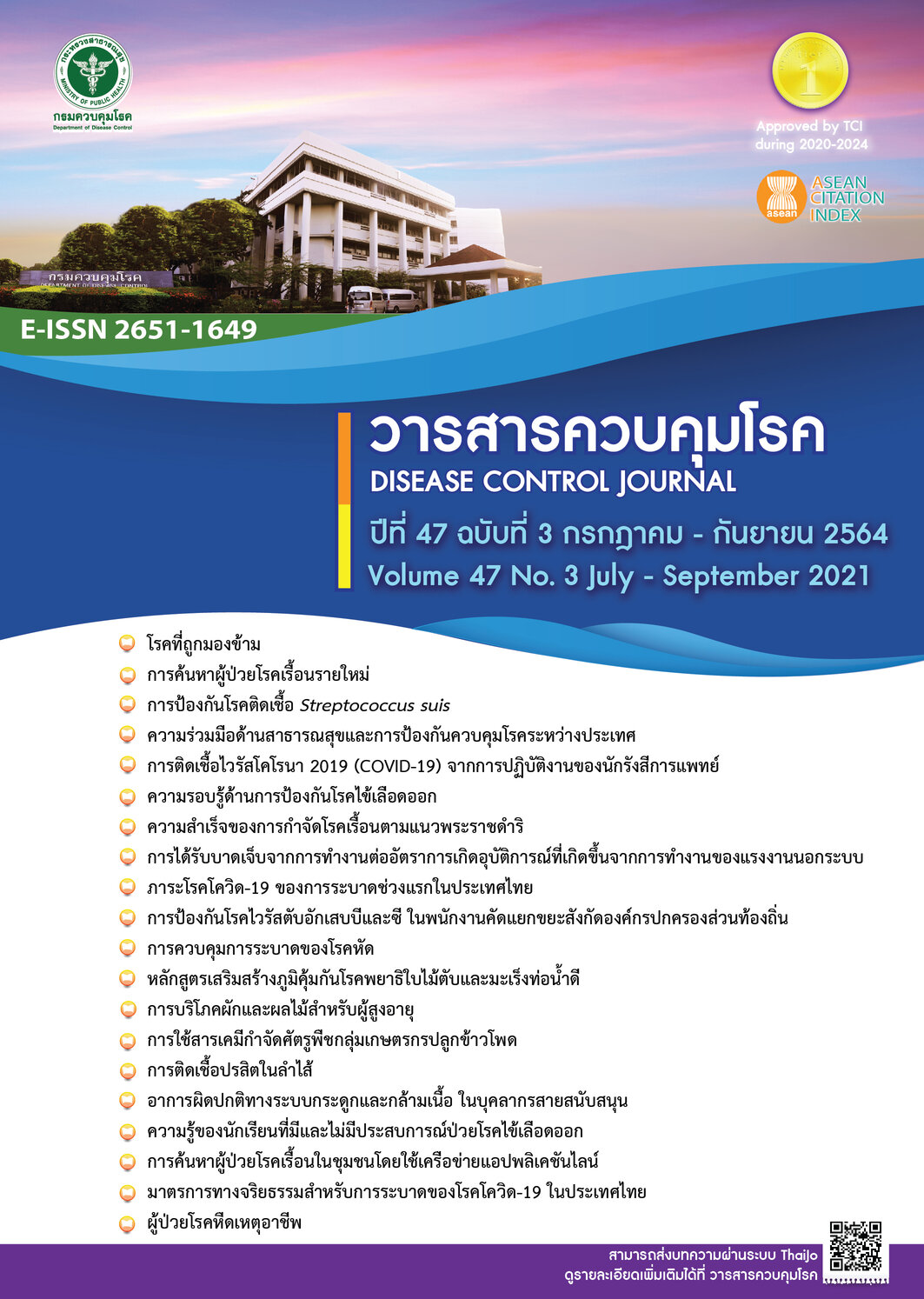knowledge towards school-based dengue prevention and control program between among students with and without illness and non-illness experience with of previous dengue infection form using school-based dengue prevention and control program in Nakhon Si Thammarat Province
DOI:
https://doi.org/10.14456/dcj.2021.54Keywords:
dengue prevention and control program, knowledge, school-based, primary schoolAbstract
Dengue fever becomes increasing every year. Especially children aged 5 -14 years are more likely to have recurrent infections and severe symptoms resulting in death. The objective of this research was to compare the knowledge on prevention and control of dengue before and after receiving the school-based dengue prevention and control program, and to compare the knowledge between the group of students with experience of previous dengue infection and the group of students without experience of dengue infection, before and after receiving the program. The participatory action research was conducted through assessing the dengue situation at school, planning and developing the program, pretesting the program, assessing knowledge of students before and after implementation. The samples were 388 primary school grade six students in Nakhon Si Thammarat province, receiving the program of 5 activities for 12 weeks. We assessed the knowledge with questionnaire. We analyzed and compared the data before and after receiving the program using Wilcoxon signed-rank test. We compared knowledge between groups with the Mann-Whitney U test. Results showed that knowledge before and after receiving the program in each group is a significant different (p < 0.01). The knowledge between groups before and after receiving the program is no significant difference (p > 0.01). It showed that students' knowledge increased after receiving the program which was developed from the participation of students, caregivers, teachers, and health volunteers. However, the programs for each student group should be particularly developed especially in the students who have illness experienced by emphasizing the caretakers’ role and the students to apply knowledge from their own experience to prevent a recurrence infection.
Downloads
References
World Health Organization. Dengue and severe dengue [Internet]. 2020 [cited 2020 Apr 30]. Available from: https://www.who.int/news-room/fact-sheets/detail/dengue-and-severe-dengue
Department of Disease Control (TH). Dengue prediction report 2020. [Internet]. [cited 2020 Apr 1]. Available from: https://drive.google.com/file/d/1nBZizJMaazVPsiXYVqdhqj5_xw8LEw_Z/view?usp=drivesdk (in Thai)
Department of Disease Control (TH). Dengue situation [Internet]. 2020 [cited 2020 Aug 23]. Available from https://ddc.moph.go.th/brc/news.php?news=13713&deptcode (in Thai)
Hanucharurnkul S. Self care: Science and Arts in Nursing. Mahidol University Faculty of Medicine Ramathibodi HospitalRamathibodi School of Nursing. 1993;187-93.
Kumsi S, Miriam Rim Madan Y. Knowledge and preventive behaviors for dengue hemorrhagic fever among secondary school tudents, Watsothonwararamworawiharn School, Na Muang Sub-district, Muang Chachoengsao District, Chachoengsao Province. HCU journal of health science. 2018;22(43-4):43-4. (in Thai)
Chinkhanaphan C, Teepapal T, Noojaroen K, Kunthamal K, Khawnakha K, Pummarin T, Wanginta K, Karikan S, Somjit C. Knowledge and disease prevention of dengue hemorrhagic fever among families who ever had one affected member. The Southern College Network Journal of Nursing and Public Health. 2015;2(2):53-65. (in Thai)
Nateemahakun T, Sarayuthpitak J. Effects of school health program to prevent dengue hemorrhagic fever disease of elementary school students. An online journal of education. 2014;9(1):209-21. (in Thai)
Charuai S, Niran T, Charuai J, Chairat P, Somjit P. Student capacity building of dengue prevention and control: A study of an Islamic school, Southern Thailand. Health. 2012;4(7):366-37647059.
Suwanbamrung C, Kusol K, Tantraseneerate K, Promsupa S, Doungsin T, Thongchan S, Laupsa M. Developing the participatory education program for dengue prevention and control in the primary school, Southern Region, Thailand. Health. 2015;7(10):1255-67. (in Thai)
Radhika NML, Gunathilaka N, Udayanga L, Kasturiratne A, Abeyewickreme W. Level of awareness of dengue disease among school children in Gampaha District, Sri Lanka, and effect of school-based health education programmes on improving knowledge and practices. BioMed Research International. 2019.
Bloom BS, Engelhart MD, Furst EJ, Hill WH. Krathwohl DR. Taxonomy of
educational objectives: the classification of educational goals: Handbook I: cognitive
domain. New York: US: D. Mckay; 1956.
Alok S, Nessa S, Ahil S.B. School training strategies for prevention and control of dengue. Indian journal of community medicine: official publication of Indian association of preventive & social medicine. 2020;45(1):106.
Kalayanarooj S. Academic manual, dengue infection and dengue hemorrhagic fever, medical and public health. [internet]. 2017. [cited 2019 Apr 28]. 16-22 Available from: https://ddc.moph.go.th/dvb/news.php?news=1133&deptcode=dvb#dengue (in Thai)
ACRLog. Tales of the Undead…Learning Theories: The Learning Pyramid, Blogging by and for academic and research librarians. [internet]. [cited 2020 May 10]. Available from: acrlog.org/2014/01/13/tales-of-the-undead-learning-theories-the-learning-pyramid/comment-page-1/
AhbiRami R, Zuharah WF. School-based health education for dengue control in Kelantan, Malaysia: Impact on knowledge, attitude and practice. PLoS neglected tropical diseases. 2020;14(3):e000075.
Udawatte U, Udayanga J, Chophel U, Hettiarachchi D. Knowledge, attitudes and practices on dengue patient management among caregivers of inward dengue patients. Sri Lankan Family Physician. 2019;35:12-20. (in Thai)
Kirdpole W, Kaewsikhaw O, Chinpatanapongsa E, Keawsuk P. Developing competency of family-community for continuing care of pediatric patients with dengue hemorrhagic fever. Journal of Nursing Science & Health. 2016;39(2):77-87. (in Thai)
Downloads
Published
How to Cite
Issue
Section
License
Articles published in the Disease Control Journal are considered as academic work, research or analysis of the personal opinion of the authors, not the opinion of the Thailand Department of Disease Control or editorial team. The authors must be responsible for their articles.






